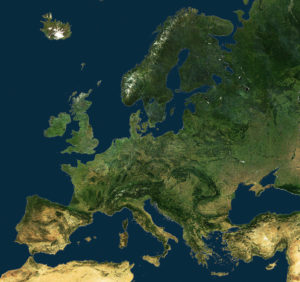
The European Union’s (EU) Permanent Structured Cooperation (PESCO) defence technology initiative announced on 12 November 2019 its decision to cooperatively develop several military space projects designed to enhance the defence and security of EU member states.
The three military space projects under PESCO include space-based ballistic missile early warning systems, military use of the Galileo global navigation satellite system (GNSS), and military space situational awareness (SSA) projects.
For ballistic missile early warning, the Timely Warning and Interception with Space-based TheatER surveillance (TWISTER) project is being led by France with the participation of Spain, Finland, the Netherlands, and Italy. The EU’s PESCO website describes TWISTER as follows:
“The spectrum of threats on the European territory is evolving towards more complex and evolving air threats, notably in the missile domain. The project therefore aims at strengthening the ability of Europeans to better detect, track and counter these threats through a combination of enhanced capabilities for space-based early warning and endo atmospheric interceptors. It promotes the European self-standing ability to contribute to NATO Ballistic-Missile Defence (BMD).”
The EU Radio Navigation Solution (EURAS) project is being coordinated by France with the participation of Belgium, Germany, Spain, Italy, and Poland. “The project is to promote development of EU military PNT (positioning, navigation and timing) capabilities and future cooperation taking advantage of Galileo and the public regulated service,” according to the PESCO website.
The European Military Space Surveillance Awareness Network (EU-SSA-N) is a space situational awareness (SSA) project being developed by France and Italy under the PESCO initiative, and is described as follows: “The main scope of this project is to develop an autonomous, sovereign EU military SSA capability that is interoperable, integrated and harmonized with the EU-SST Framework initiative for the protection of European MS Space assets and services. It will also enable appropriate response to natural and manmade threats.”
Finally, two other PESCO initiative projects with satellite roles are also underway. The first of these is the Geo-Meteorological and Oceanographic (GEOMETOC) Support Coordination Element (GMSCE), that is described as a project, “to enhance geospatial, meteorological and oceanographic (GeoMETOC) support for missions and operations by means of an architecture that connects and improves significantly the European GeoMETOC capabilities…” The GMSCE is being led by Germany with the participation of Austria, Greece, France, Portugal, and Romania, and will likely involve the use of data derived from member state meteorological, environmental monitoring, and oceanographic satellites.
The second is the Strategic Command and Control (C2) System for Common Security and Defence Policy (CSDP) Missions and Operations that is led by Spain with the participation of Germany, France, Italy, the Netherlands, and Portugal, and involves the use of satellite communications as well as satellite Earth observation. The PESCO website describes this project as one that:
“…aims to improve the command and control systems of EU missions and operations at the strategic level. Once implemented, the project will enhance the military decision-making process, improve the planning and conduct of missions, and the coordination of EU forces. The Strategic Command and Control (C2) System for CSDP Missions will connect users by delivering information systems and decision-making support tools that will assist strategic commanders carry out their missions. Integration of information systems would include intelligence, surveillance, command and control, and logistics systems.”





